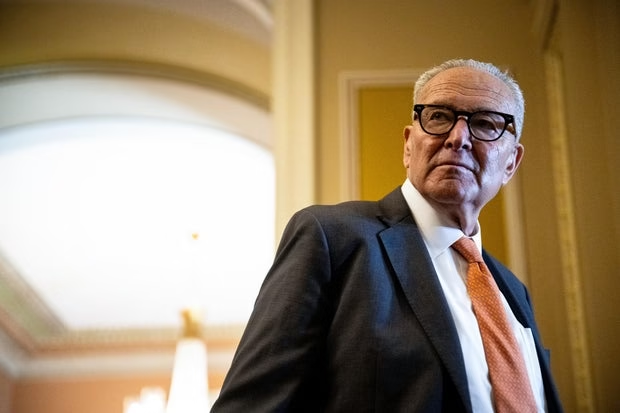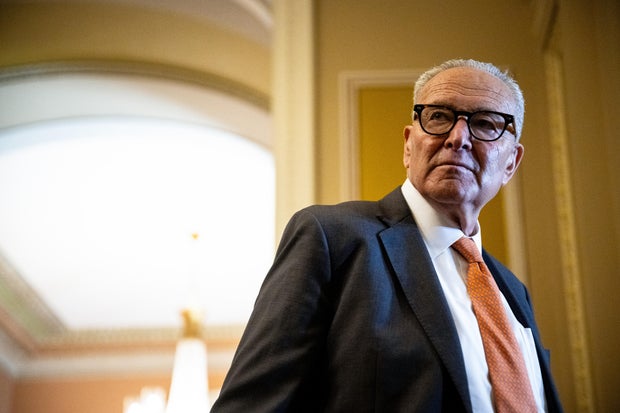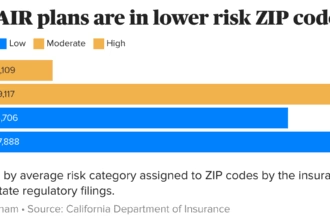Washington — Republicans and Democrats in Congress are still far apart on how to avert a government shutdown just three weeks before funding runs out.
The top appropriators in Congress have been meeting this week to discuss a path forward. And Democratic leaders in the House and Senate are expected to meet Wednesday on the issue. But Senate Minority Leader Chuck Schumer, a New York Democrat, told reporters Wednesday that “what the Republicans have proposed is not good enough to meet the needs of the American people and not good enough to get our votes.”
The White House has requested that Congress pass a short-term funding deal to keep the government open through January, while leaders in Congress have generally favored a shorter-term stopgap measure to allow for work to continue on full-year funding bills.
Rep. Rosa DeLauro of Connecticut, the top Democrat on the House Appropriations Committee, said the White House sent a request Tuesday “to kick the can down the road on government funding until January 31.” She argued the tactic would allow the Trump administration to hold back funds approved by Congress.
“Delaying the critical work of funding the government until the end of January is only step one in President Trump and Russ Vought’s plan to never fund it at all,” DeLauro said.
Graeme Sloan / Bloomberg via Getty Images
In August, the White House notified Congress that it would attempt to override its funding power by rescinding nearly $5 billion in foreign aid using a rare tactic known as a “pocket recession.” Since the request came within 45 days of the end of the fiscal year, the White House argued that it could treat the funding as expired come October.
The move angered Democrats and some Republicans, adding another snag to shutdown negotiations.
House Majority Leader Steve Scalise, a Louisiana Republican, told reporters Tuesday that the date proposed by the White House isn’t set in stone.
“The White House put a marker out there. Nobody’s married to a particular date,” Scalise said, adding that congressional appropriators “will be a part of that discussion with the White House on the date.”
Scalise said the House floor’s schedule is flexible enough to be able to move on a continuing resolution as soon as an agreement is reached.
“I hope they get a bipartisan agreement. And that’s the goal of [House Appropriations Committee] Chairman Cole and the White House, is to get an agreement with everybody,” Scalise said. “That’s where the talks are right now.”
But Scalise said there’s no agreement on a health care subsidies extension, which Democrats have been eyeing as a possible requirement for their support.
Tax credits for Americans who purchase health insurance through the Affordable Care Act marketplace are set to lapse at the end of year and could send premiums soaring.
Schumer pointed to the expiration of the tax credits earlier Wednesday, saying “this would be a nightmare scenario for the American people.” But he said Senate Majority Leader John Thune has indicated that “Republicans will walk away from the table and sit on their hands.”
Thune, a South Dakota Republican, has said that he prefers as “clean” a bill as possible to potentially secure bipartisan support and continue work on full-year funding measures. He told reporters earlier this week that it’s his expectation that the House, where the bill will likely originate, “would have it fairly clean,” minimizing anomalies.
“If you want to make it about trying to get an extension so we actually have time to try and run a normal appropriations process and get some of the bills passed under regular order, then I think you want to have it as clean as possible,” Thune said. “And I think it’s in everybody’s interest to do that.”
Still, the White House has pursued anomalies, seeking to fund certain programs at higher levels under a stopgap measure.
Meanwhile, the House is voting Wednesday on whether to go to conference on a Senate-passed package of appropriations bills, which includes the military construction and veterans affairs bill, agriculture bill and legislative branch appropriations bill.
Sen. Patty Murray of Washington, the top Democratic appropriator in the Senate, said Tuesday that she and her fellow appropriators had a “‘very productive conversation” earlier this week about conferencing the first three bills, along with passing a bipartisan short-term continuing resolution to give them time to continue work on full-year spending bills. But she urged that Democrats need to hear from GOP leaders about their commitment to a bipartisan stopgap measure to “move this ball forward.”
“Let’s remember, Republicans control the House, the Senate and the White House. They are quite literally in the driver’s seat. And if Republican leadership, for whatever reason, decides to let the car go off the cliff, we know who will be held responsible.”
But House Speaker Mike Johnson, a Louisiana Republican, put the onus on Democrats earlier Tuesday, saying “Democrats may take the path of maximum resistance and shut the government down.”
“The ultimate question of whether there’s going to be a government shutdown at the end of the month is going to be up to congressional Democrats and that’s just the way it is,” Johnson said.
Asked Wednesday whether House Democrats would support a clean continuing resolution, House Minority Leader Hakeem Jeffries cited the continuing resolution passed in March despite House Democrats’ objections, saying “a continuing resolution that continues the failed policies of the Republican party that we voted against is not the type of policy that actually meets the needs of the American people.”
“I believe that all of us are ready to continue the fight,” Jeffries, a New York Democrat, said of Democrats in Congress.
That fight has taken on particular importance for Senate Democrats, after Schumer came under intense scrutiny from his own party earlier this year. After pledging to fight the GOP funding plan in March, which increased defense spending while decreasing non-defense spending below 2024 levels, Schumer changed course at the eleventh hour, ultimately opting to deliver one of the Democratic votes necessary to propel the partisan measure to passage and prevent a shutdown. Despite intense criticism from some within his own party, Schumer argued at the time that a shutdown risked more damage.
Schumer said Wednesday, with a new funding deadline fast approaching, that if Republicans “think Democrats are going to show up at the last minute to bail them out with the clock approaching zero, that would be a big mistake on their part.”
“Democrats don’t want to see a Republican shutdown,” Schumer added. “What we want is a bipartisan negotiation, bipartisan bill, where Democrats have input to tangibly under the carnage Donald Trump has done to America.”
Cristina Corujo and
contributed to this report.










